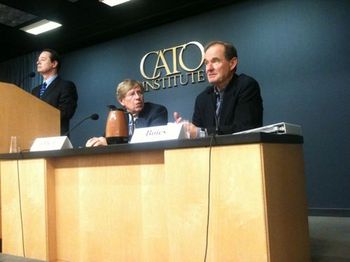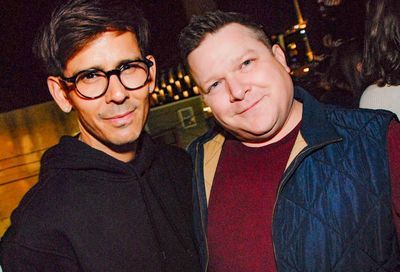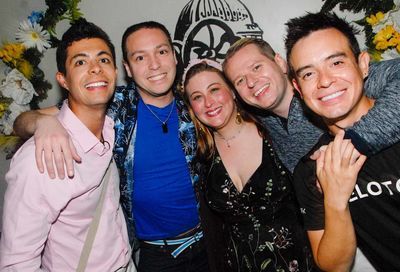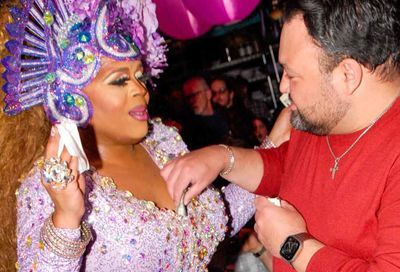Olson and Boies Talk About Their Prop 8 Victory, With Slightly Differing Takes
One of the lawyers fighting Proposition 8 said that today’s decision of the U.S. Court of Appeals for the Ninth Circuit in Perry v. Brown striking down the initiative makes it “somewhat less likely” that the U.S. Supreme Court would hear an appeal of the case, while his co-counsel was more ambitious, suggesting that the ruling could have a ripple effect of advancing marriage equality in Georgia and Arkansas.
 On a conference call organized by the American Foundation for Equal Rights, which brought the case, attorney David Boies told reporters, “I think the grounds do make it somewhat less likely that the Supreme Court will take it.”
On a conference call organized by the American Foundation for Equal Rights, which brought the case, attorney David Boies told reporters, “I think the grounds do make it somewhat less likely that the Supreme Court will take it.”
Ted Olson, Boies’s co-counsel in the case, was not pushing nuance today, savoring victory in the case that has become a dedicated cause for him: “This is a very significant milepost on the way to equality in this country.”
In his view of the ruling, Olson said, “The district court earlier and the Ninth Circuit today ringingly reaffirmed the right to equality, the fundamental right to marriage and the fact that it cannot be denied to citizens on the basis of their sexual orientation or the basis of their sex.”
The decision was, on its face, based on more narrow legal grounds than those put forth by U.S. District Court Judge Vaughn Walker in his trial court decision striking down the law in August 2010. The appeals court affirmed the trial court decision by finding Proposition 8 unconstitutional for the reasons established by the U.S. Supreme Court in striking down Colorado’s Amendment 2 in Romer v. Evans.
In Romer, Colorado voters adopted an amendment prohibiting state and local entities from passing sexual orientation protections. The U.S. Supreme Court struck Colorado’s Amendment 2 down as a violation of the Fourteenth Amendment’s equal protection clause because the amendment’s aim, as the Ninth Circuit stated today, was “not to further a proper legislative end but to make [LGB people] unequal to everyone else.”
Ninth Circuit Judge Stephen Reinhardt then wrote for the court: “Proposition 8 is remarkably similar to Amendment 2.”
“With a precedent like Romer that so squarely fits,” Boies asserted that the outcome in the Ninth Circuit’s opinion was solid. To that end, Boies added: “The [Supreme] Court might not want to take this issue on on those facts and might want to wait for a case that raises the more general issue.”
University of California-Irvine law professor Rick Hasen noted that Boies’s sentiment also had relevance even if the Supreme Court does, eventually, accept review of the Perry case because Justice Anthony Kennedy, who many think would be the swing vote in Supreme Court consideration of the case, wrote the Romer opinion.
“Notably, Judge Reinhardt does not hold there is a right to same sex marriage, only that [California] had no rational reason to take away the label of marriage for use by gay and lesbian couples after the state had had already given it,” Hasen writes. “By crafting the argument in this way, and making the case that the only reason for passing Prop. 8 was anti-gay animus, Judge Reinhardt has given Justice Kennedy a way to decide the case without embracing a major holding recognizing a right to same sex marriage generally.”
Despite the narrow scope on the face of the opinion, Boies conceded somewhat to Olson’s more ambitious stance, saying, “The reasoning of the case is reasoning that clearly would support a national right to marriage equality.”
Responding to a question about how Reinhardt’s opinion stated that it was a limited one reaching only the Romer question about taking away a right based on animus and not the broader question of marriage equality, Olson was incredulous: “Judges say that all the time. They’re not reaching more than what they have to. But the reasoning [applies to other cases].”
Specifically, Olson pointed to the Supreme Court’s opinion in Lawrence v. Texas, which struck down sodomy laws in the country as unconstitutional. Despite the fact that Kennedy, who wrote Lawrence‘s majority opinion as well, said Lawrence did not relate to marriage, Olson noted that Justice Anthony Scalia wrote in his dissenting opinion in the case, “At the end of [Kennedy’s majority] opinion — after having laid waste the foundations of our rational-basis jurisprudence — the Court says that the present case ‘does not involve whether the government must give formal recognition to any relationship that homosexual persons seek to enter.’ Do not believe it.”
Olson said of today’s decision: “I will say the same thing here. Our opponents are going to say, ‘That didn’t decide what goes on in Georgia. That didn’t decide what goes on in Arkansas.’ But we’re talking about the fundamental right of individuals to enjoy the relationship of marriage. This decision talks in terms of how important and fundamental that is.”
When the question of the videotapes of the trial were raised on the call, Boies took things to a less professorial place, suggesting that the Dustin Lance Black play about the trial, titled simply 8, could be more effective a presentation to the public than the tapes because of the performer playing Boies at the Los Angeles premiere of the show on March 3.
“They may find George Clooney a lot more interesting than watching David Boies,” he said with a chuckle.
[Photo: Ted Olson, center, and David Boies, right, answer questions by audience members selected by David Boaz, Cato’s executive vice president, on Wednesday, May 18, 2011. (Photo by Chris Geidner.)]
Support Metro Weekly’s Journalism
These are challenging times for news organizations. And yet it’s crucial we stay active and provide vital resources and information to both our local readers and the world. So won’t you please take a moment and consider supporting Metro Weekly with a membership? For as little as $5 a month, you can help ensure Metro Weekly magazine and MetroWeekly.com remain free, viable resources as we provide the best, most diverse, culturally-resonant LGBTQ coverage in both the D.C. region and around the world. Memberships come with exclusive perks and discounts, your own personal digital delivery of each week’s magazine (and an archive), access to our Member's Lounge when it launches this fall, and exclusive members-only items like Metro Weekly Membership Mugs and Tote Bags! Check out all our membership levels here and please join us today!
























